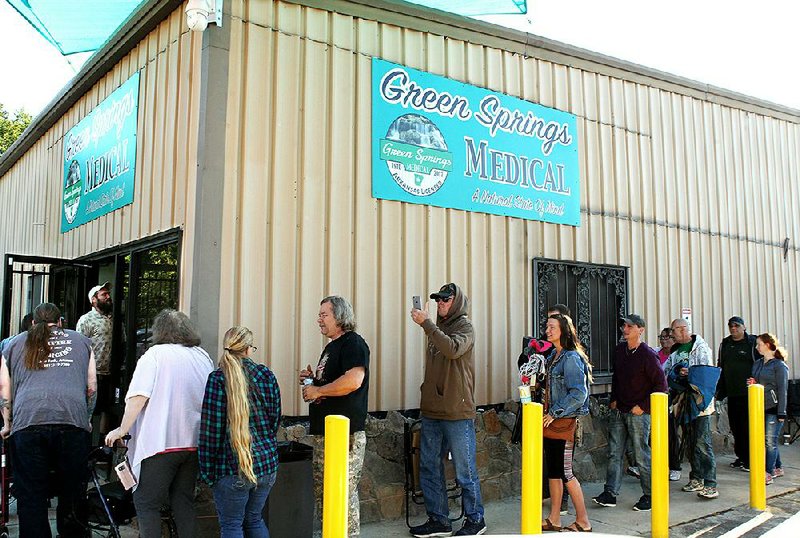Arkansas' first two medical marijuana retailers sold more than 13 pounds of the drug during the first few days of sales, according to data reported to state regulators.
As of 1 p.m. Monday, the two Hot Springs dispensaries -- Green Springs Medical and Doctor's Orders RX -- had sold 13.76 pounds of dried cannabis flower, according to figures reported to the Arkansas Department of Finance and Administration.
Both companies have publicized prices of $15 per gram, meaning the first few days of sales exceeded $93,000.
Doctor's Orders RX made the first sale in Arkansas on Friday afternoon; Green Springs Medical made its first sale Sunday. The average transaction amount was $79.62, according to the finance department data. Green Springs Medical had said it would sell the drug at $395 an ounce, but it also limited the amount sold to no more than a half-ounce at $15 per gram.
Because of current limitations in software, the state doesn't yet know how many patients made purchases, said Scott Hardin, a spokesman for the finance department.
About 200 people waited in line at Doctor's Orders RX on Saturday morning, the first full day of sales, and lines -- though much shorter -- continued on Sunday and Monday at both dispensaries, patients and spokesmen for the companies said.
[RELATED: Complete Democrat-Gazette coverage of medical marijuana in Arkansas]
Jacqueline Petty, 43, of Harrison made the 3½-hour drive to Hot Springs on Sunday to visit Green Springs Medical, where she said the line moved efficiently.
"They were all so nice," she said. "They gave us water and helped pick which strain would help us the most. I was very impressed."
Friday marked the official debut of Arkansas' medical marijuana program, the 33rd in the U.S. It came more than two years after Arkansans voted to legalize the drug, approving Amendment 98 to the Arkansas Constitution in 2016.
Patients or their registered caregivers can buy medical marijuana if doctors have certified that the patients suffer from one of 18 qualifying conditions. As of Friday, the Arkansas Department of Health had issued 11,739 medical-marijuana registry ID cards.
Regulatory snags and court challenges delayed cultivation businesses getting off the ground as well as the opening of the first dispensary. Once mature, Arkansas' medical-cannabis market will have 32 dispensaries across the state and five cultivation facilities. The drug used in Arkansas must be grown and processed in the state.
Currently, only the two Garland County dispensaries have passed Alcoholic Beverage Control's final inspection, which permits a retailer to open for business. Hardin said Monday that no other dispensaries had requested final inspections.
Doctor's Orders RX, in its application for a dispensary license, estimated that its business start-up costs would exceed $1.2 million. Green Springs Medical estimated its start-up costs -- including the first 90 days of operations -- to be about $185,000.
Bold Team in Cotton Plant is the only licensed cultivator in the state to have harvested and processed cannabis. Natural State Medicinals Cultivation in White Hall and Osage Creek Cultivation in Berryville are expected to harvest in the coming weeks. The final two growers -- Delta Medical Cannabis Co. and Natural State Wellness Enterprises, both in Newport, are still building their growing facilities.
The price of the drug is higher in Arkansas than in other states where it's been legalized for longer. In Oklahoma and Arizona, for example, it can be purchased for about $10 per gram.
Arkansas police spokesmen said the drug can be purchased illegally off the street for $4 per gram or less, but they noted that there's no guarantee the marijuana off the black market has been tested for quality and harmful chemicals like products regulated by the state.
Medical-marijuana markets in other states watched prices drop once supply of the drug started to match demand.
Heather Outler, 26, of Royal said she purchased 2 grams of cannabis from Green Springs Medical on Monday because she lives on a fixed income. After tax, she said, each gram was about $17. In addition to sales tax, the state imposes a 4% privilege tax on medical marijuana.
Outler said dispensary officials told her that they expect the per-gram price to drop to about $10 after more harvests and cultivators enter the market.
Outler, who uses cannabis to treat fibromyalgia and post-traumatic stress disorder, said 2 grams of the drug would only last her a day or two.
"They don't have any options for low-income people," she said, noting that dispensaries are bound by the price that cultivators charge. The drug isn't covered by health insurance.
Petty, who has several autoimmune diseases and anxiety, purchased a half ounce of cannabis from Green Springs Medical on Sunday for about $213 before tax, she said. She recently quit using opioids to treat her pain, and she said that drastically improved her quality of life.
She smoked the first portion of medical cannabis on Sunday night.
"Last night was the best night of sleep I've had in six months," she said Monday.
Through the first three days of sales, the state-mandated "seed-to-sale" tracking software was the biggest source of delays at the two dispensaries. The tracking software allows state watchdogs to ensure that no patient purchases more than 2.5 ounces of medical marijuana every two weeks, which is the limit under state law.
Hardin said some of the software issues have been caused by mix-ups with patients' registry ID cards. The state Health Department initially began issuing the cards, which expire after a year unless otherwise specified, in February. But since the first dispensary didn't open until Friday, the agency decided to issue new cards so patients could use them for the entire term they were intended.
Hardin said the software didn't recognize the original registry card if a patient had been issued a subsequent ID by the Health Department.
A Section on 05/14/2019
